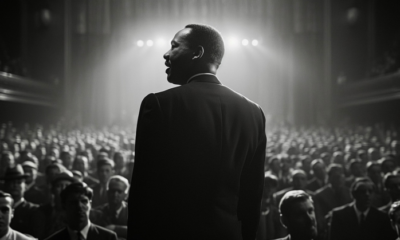Life
Ask Yourself These 3 Questions to Determine Your Life’s Potential

Worldview, it’s one of the biggest buzzwords of the twenty-first century. But what does it mean and how does it help us? Worldview is our set of beliefs about the nature of reality. It is an internal doctrine that answers the biggest questions of life and guides our responses in specific circumstances.
The late Leo Apostel of the University of Brussels gave a framework of worldview that consists of several key components. These are some of the biggest of life’s questions. A person’s responses to these questions will determine how they interact with their world and therefore establish how much impact they will have.
Here are three of the most critical worldview questions which also determine your potential:
1. What is the nature of life?
This is the most fundamental of the worldview questions. It seeks to define our place in this wonderfully complex and expansive cosmos we live in. At one end of the spectrum, a person’s worldview could be that life is fragmentary, isolated, random, and meaningless. This is a prolific view academically but can be uninspiring.
At the opposite end of the spectrum, another person’s worldview might say that all of life is ordered and filled with purpose. This is readily observable in nature and proven by science. Systems of every kind, from ecosystems to all of the systems of the human body, demonstrate order and purpose.
The impact of this particular worldview is staggering—if the universe around us is structured and purposeful then, by default, so are we. How we view our world in this manner empowers us to live with purpose, dignity, and inspiration. It frees us to reach our greatest potential in life.
“Consciously and unconsciously, intentionally and involuntarily, willfully and unsuspectingly, our beliefs are the sum total of our lives. It’s that simple.” – Patty Houser
2. Where are we going?
This defining question of worldview has two major aspects. The first is our expectation. Based on where we, as humanity have been, and what we believe about our world, what do we expect to accomplish? In other words, it answers some of the following questions:
- Is the future a hopeful place?
- What good things does it have in store for us?
- How much can I personally contribute to that future?
With a healthy expectation, we look longingly to the future in earnest hope for humanity’s highest potential.
The second is vision. If expectation is about where we believe we are headed, vision is about where we intend to go. With a compelling vision of the future, the greatest leaders in history have moved countless souls to create lasting and significant change. A healthy worldview believes the future has a place for us and that we can impact it. Truly, what we believe about—and intend—for the future can unleash tremendous possibility for us.
“I have a dream that ONE DAY this nation will rise up and live out the true meaning of its creed: We hold these truths to be self-evident, that all men are created equal.” – Martin Luther King Jr.
3. What do I believe?
This question regards our values, the things we hold dear to us and that mold our concept of right versus wrong. The promotion and protection of values are some of the most motivating forces in humanity through the ages. Consider the greatest wars, revolts, and movements of history, they were founded on passionate positions regarding values.
Values lead to conviction and conviction is what provides the “fight” in life. A true understanding of our values, or what we stand for, provides an urgency that conquers the common ailment of complacency. By having a clear picture of what you believe in, you can find the internal motivation to push forward through the adversity of life and make a significant difference in the world.
How do you wake up everyday and push forward? Let us know in the comments below!
Image courtesy of Twenty20.com
Did You Know
How Skilled Migrants Are Building Successful Careers After Moving Countries
Behind every successful skilled migrant career is a mix of resilience, strategy, and navigating systems built for locals.

Moving to a new country for work is exciting, but it can also be unnerving. Skilled migrants leave behind familiar systems, networks, and support to pursue better job opportunities and a better future for their families. (more…)
Life
10 Research-Backed Steps to Create Real Change This New Year
This New Year could finally be the one where you break old patterns and create real, lasting change.

Every New Year, we make plans and set goals, but often repeat old patterns. (more…)
Life
9 Harsh Truths Every Young Man Must Face to Succeed in the Modern World
Before chasing success, every young man needs to face these 9 brutal realities shaping masculinity in the modern world.

Many young men today quietly battle depression, loneliness, and a sense of confusion about who they’re meant to be.
Some blame the lack of deep friendships or romantic relationships. Others feel lost in a digital world that often labels traditional masculinity as “toxic.”
But the truth is this: becoming a man in the modern age takes more than just surviving. It takes resilience, direction, and a willingness to grow even when no one’s watching.
Success doesn’t arrive by accident or luck. It’s built on discipline, sacrifice, and consistency.
Here are 9 harsh truths every young man should know if he wants to thrive, not just survive, in the digital age.
1. Never Use Your Illness as an Excuse
As Dr. Jordan B. Peterson often says, successful people don’t complain; they act.
Your illness, hardship, or struggle shouldn’t define your limits; it should define your motivation. Rest when you must, but always get back up and keep building your dreams. Motivation doesn’t appear magically. It comes after you take action.
Here are five key lessons I’ve learned from Dr. Peterson:
-
Learn to write clearly; clarity of thought makes you dangerous.
-
Read quality literature in your free time.
-
Nurture a strong relationship with your family.
-
Share your ideas publicly; your voice matters.
-
Become a “monster”, powerful, but disciplined enough to control it.
The best leaders and thinkers are grounded. They welcome criticism, adapt quickly, and keep moving forward no matter what.
2. You Can’t Please Everyone And That’s Okay
You don’t need a crowd of people to feel fulfilled. You need a few friends who genuinely accept you for who you are.
If your circle doesn’t bring out your best, it’s okay to walk away. Solitude can be a powerful teacher. It gives you space to understand what you truly want from life. Remember, successful men aren’t people-pleasers; they’re purpose-driven.
3. You Can Control the Process, Not the Outcome
Especially in creative work, writing, business, or content creation, you control effort, not results.
You might publish two articles a day, but you can’t dictate which one will go viral. Focus on mastery, not metrics. Many great writers toiled for years in obscurity before anyone noticed them. Rejection, criticism, and indifference are all part of the path.
The best creators focus on storytelling, not applause.
4. Rejection Is Never Personal
Rejection doesn’t mean you’re unworthy. It simply means your offer, idea, or timing didn’t align.
Every successful person has faced rejection repeatedly. What separates them is persistence and perspective. They see rejection as feedback, not failure. The faster you learn that truth, the faster you’ll grow.
5. Women Value Comfort and Security
Understanding women requires maturity and empathy.
Through books, lectures, and personal growth, I’ve learned that most women desire a man who is grounded, intelligent, confident, emotionally stable, and consistent. Some want humor, others intellect, but nearly all want to feel safe and supported.
Instead of chasing attention, work on self-improvement. Build competence and confidence, and the rest will follow naturally.
6. There’s No Such Thing as Failure, Only Lessons
A powerful lesson from Neuro-Linguistic Programming: failure only exists when you stop trying.
Every mistake brings data. Every setback builds wisdom. The most successful men aren’t fearless. They’ve simply learned to act despite fear.
Be proud of your scars. They’re proof you were brave enough to try.
7. Public Speaking Is an Art Form
Public speaking is one of the most valuable and underrated skills a man can master.
It’s not about perfection; it’s about connection. The best speakers tell stories, inspire confidence, and make people feel seen. They research deeply, speak honestly, and practice relentlessly.
If you can speak well, you can lead, sell, teach, and inspire. Start small, practice at work, in class, or even in front of a mirror, and watch your confidence skyrocket.
8. Teaching Is Leadership in Disguise
Great teachers are not just knowledgeable. They’re brave, compassionate, and disciplined.
Teaching forces you to articulate what you know, and in doing so, you master it at a deeper level. Whether you’re mentoring a peer, leading a team, or sharing insights online, teaching refines your purpose.
Lifelong learners become lifelong leaders.
9. Study Human Nature to Achieve Your Dreams
One of the toughest lessons to accept: most people are self-interested.
That’s not cynicism, it’s human nature. Understanding this helps you navigate relationships, business, and communication more effectively.
Everyone has a darker side, but successful people learn to channel theirs productively into discipline, creativity, and drive.
Psychology isn’t just theory; it’s a toolkit. Learn how people think, act, and decide, and you’ll know how to lead them, influence them, and even understand yourself better.
Final Thoughts
The digital age offers endless opportunities, but only to those who are willing to take responsibility, confront discomfort, and keep improving.
Becoming a man today means embracing the hard truths most avoid.
Because at the end of the day, success isn’t about luck. It’s about who you become when life tests you the most.
Change Your Mindset
The Four Types of Happiness: Which One Are You Living In?
Most people chase success only to find emptiness, this model reveals why true happiness lies somewhere else.

In a world driven by rapid technological growth and constant competition, many people unknowingly trade joy for achievement. (more…)
-

 Health & Fitness2 weeks ago
Health & Fitness2 weeks agoWhat Minimalism Actually Means for Your Wellness Choices
-

 News1 week ago
News1 week agoBrandon Willington Builds 7-Figure Business by Ignoring Almost Everything
-

 Did You Know2 weeks ago
Did You Know2 weeks agoWhy Most Online Courses Fail and How to Fix Them
-

 Business2 weeks ago
Business2 weeks agoIf Your Business Internet Keeps Letting You Down, Read This
-

 Business1 day ago
Business1 day agoEntrepreneur’s Guide to Pay Stubs: Why Freelancers and Small Business Owners Need a Smart Generator
























2 Comments